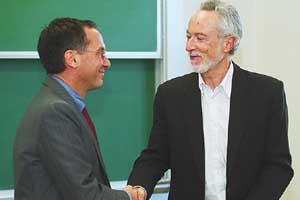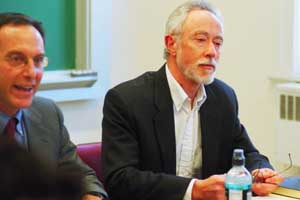Coetzee wins Nobel Prize
 Jonathan Lear (left), the John U. Nef Distinguished Service Professor in the Committee on Social Thought and the College, congratulates his colleague John Coetzee, Distinguished Service Professor in the Committee on Social Thought, who received the Nobel Prize in Literature last Thursday. |
Coetzee, who has taught in the University’s Committee on Social Thought since 1996, became a Professor in 2001 and a Distinguished Service Professor in July.
In a statement released just hours after the Nobel announcement was made in Sweden, Coetzee wrote: “I received the news in a phone call from Stockholm at 6 this morning [Thursday, Oct. 2]. It came as a complete surprise—I was not even aware that the announcement was pending. I am particularly happy that the announcement has come during this Autumn Quarter, which is the time of year that I spend at the University of Chicago.
“The University of Chicago, and in particular the Committee on Social Thought, has been my intellectual home for the past seven years,” said Coetzee. He also noted that his literary predecessor in the Committee on Social Thought, Saul Bellow, had won the 1976 Nobel Prize in Literature.
One of Coetzee’s Chicago colleagues, Wayne Booth, the George M. Pullman Distinguished Service Professor Emeritus in English Language & Literature, praised Coetzee’s writing. “Having read almost all of Coetzee’s work, I can honestly say that if I had been on the Nobel Prize Committee, he would have received it earlier. This enthusiasm springs from the ways in which he imagines himself sympathetically into characters of so many diverse kinds.”
A scholar of literature who has written on the language, ethics and politics of figures ranging from Erasmus to Tolstoy and Kafka, Coetzee is the first writer to be awarded twice Britain’s highest honor for fiction, the Booker prize. He first won the prize in 1983 for The Life and Times of Michael K. and again in 1999 for Disgrace.
Robert Pippin, the Raymond W. and Martha Hilpert Gruner Distinguished Service Professor in Philosophy and the Committee on Social Thought, commented on Coetzee’s Disgrace just after Coetzee had won his second Booker Prize.
“I found it a very powerful book,” he said. “It presents the confusing moral world and dwindling moral alternatives faced by South Africans in ways that are almost unbearably painful to read about, and then helps you realize why such issues are not limited to South Africa.”
Among Coetzee’s academic writings are Giving Offense: Essays on Censorship, The Lives of Animals, and White Writing: On the Culture of Letters in South Africa.
Educated at the University of Cape Town, Coetzee earned B.A.s with honors in English (1960) and Mathematics (1961). He was awarded an M.A. in English there in 1963. After travel to Britain, he completed Ph.D. work in English at the University of Texas, Austin in 1969.
Coetzee, who also is a recipient of the Jerusalem Prize, the Commonwealth Literary Award and the rank of Chevalier dans l’Ordre des Arts et des Lettres in the Royal Society of Literature, taught at the State University of New York and the University of Cape Town, as well as Harvard and the Johns Hopkins universities, before joining the Chicago faculty.
Nathan Tarcov, Chairman and Professor of the Committee on Social Thought, described Coetzee as a dedicated teacher. “John Coetzee has been an invaluable colleague on the Committee on Social Thought the past seven years,” said Tarcov. “He is admired by the students not only for his insight into works of literature, but for his conscientious dedication to their education. All the faculty and students of the Committee on Social Thought are thrilled at his newest honor.”
As with collaborative research at the University, co-taught courses also preserve and promote Chicago’s interdisciplinary approach to research and teaching. “This year I am teaching two courses with colleagues here—a course on Plato with the philosopher Jonathan Lear, and a course on Walt Whitman with the poet Mark Strand. And I am of course continuing with my own work. I am working on new fiction, and I have a book of translations of Dutch poets due out shortly,” said Coetzee in his statement.
 Jonathan Lear (left) and John Coetzee begin a session of their co-taught course on Plato on Monday afternoon. |
Jonathan Lear, the John U. Nef Distinguished Service Professor in the Committee on Social Thought, described what Coetzee gives his students—those in the classroom and those who inevitably will learn from reading his books.
“John Coetzee is one of the great writers of our times, but he is also one of the world’s great teachers. In the tradition of the exemplar, and the witness, he teaches us all what is really involved in reading a great book. He has taught me to look with greater clarity at the human soul, and his remarks in and out of class are lifetime memories, reverberating away.”
![[Chronicle]](/images/sidebar_header_oct06.gif)